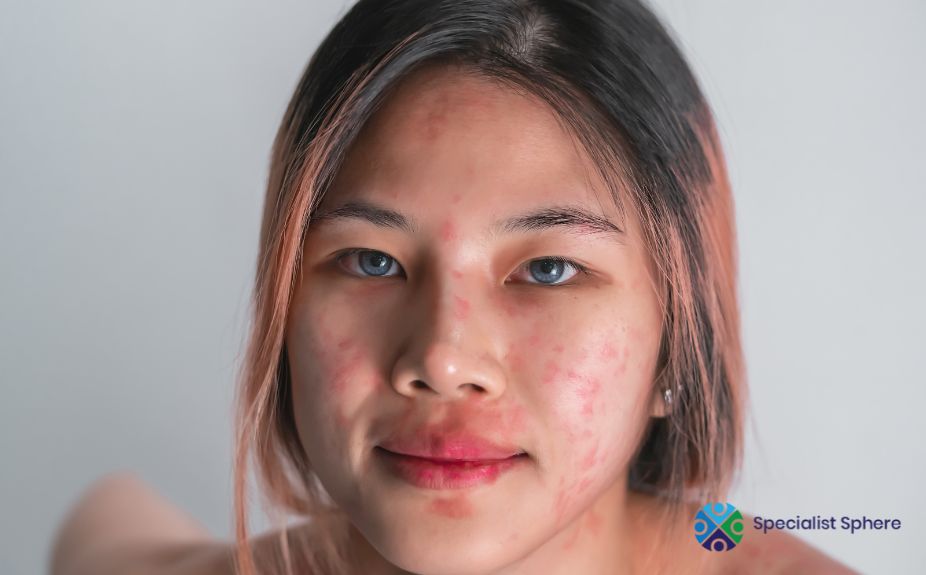Rosacea is a chronic inflammatory skin condition that can cause persistent facial redness, visible blood vessels, and acne-like breakouts. While there’s no permanent cure, effective management and treatment can significantly reduce symptoms and improve your skin’s appearance and health. This guide will explore various treatments and skincare tips to help you control rosacea flare-ups and find long-term relief.
What Is Rosacea and What Causes It?
Rosacea is a complex skin condition influenced by genetic, environmental, and immune factors. Understanding its triggers is key to effective management.
What are the most common rosacea triggers?
Flare-ups are often provoked by a variety of factors, including:
- Genetics: A family history of rosacea increases your risk, suggesting a hereditary link.
- Vascular Issues: Dilated or weak blood vessels can lead to persistent redness and flushing.
- Immune System Response: An overactive immune system can trigger chronic inflammation, causing skin irritation and sensitivity.
- Environmental and Lifestyle Factors: Sun exposure, extreme temperatures, stress, and certain foods or drinks (like spicy food and alcohol) can all trigger symptoms.
- Demodex Mites: These microscopic mites are a natural part of our skin’s ecosystem but are found in higher numbers in people with rosacea, potentially contributing to inflammation.
Advanced Rosacea Treatment Options for Long-Term Relief
Achieving long-term relief from rosacea symptoms requires a comprehensive, tailored approach. Here are some of the most effective professional treatments.
In-Clinic Rosacea Treatments: Light, Laser, and Regenerative Therapies
How can laser and light therapies help rosacea?
Laser and light-based treatments target the underlying causes of redness and inflammation, offering a non-invasive way to improve skin tone and texture.
- Intense Pulsed Light (IPL) Therapy: IPL uses broad-spectrum light to reduce diffuse redness and broken capillaries while stimulating collagen production, leading to smoother, clearer skin.
- Q-Switched Laser Rejuvenation: This laser targets excess pigmentation and vascular irregularities, evening out skin tone and improving overall skin clarity.
- LED Light Therapy: This gentle, non-invasive treatment uses specific light wavelengths to calm inflammation and reduce flushing, making it a great add-on to other rosacea treatments.
What are the best regenerative treatments for rosacea?
These advanced therapies help strengthen and heal the skin from within, making it more resilient to flare-ups.
- Radiofrequency (RF) Microneedling: This treatment combines microneedling with RF energy to stimulate collagen and elastin production. It helps reduce redness, tighten skin, and strengthen the skin barrier.
- Polynucleotide Skin Boosters: These injectable boosters promote cellular repair and deep hydration, reducing inflammation and making rosacea-prone skin less reactive to environmental stress.
- Exosome Therapy: Using stem cell-derived exosomes, this treatment delivers growth factors and peptides to repair damaged tissue and reduce inflammation, helping to heal the skin barrier.
How can Iontophoresis improve my rosacea?
Iontophoresis uses a mild electrical current to enhance the absorption of anti-inflammatory serums and active ingredients into the deeper layers of the skin, providing more effective relief from redness and irritation.
Skincare for Rosacea-Prone Skin: Essential Tips for Daily Care
A consistent, gentle skincare routine is crucial for managing rosacea and preventing flare-ups.
What are the best skincare products for rosacea?
- Gentle Cleanser: Use a fragrance-free, non-foaming cleanser to avoid stripping your skin’s natural moisture barrier.
- Daily Moisturiser: Opt for a lightweight, non-comedogenic moisturiser with ingredients like ceramides or hyaluronic acid to keep your skin hydrated and strong.
- Mineral Sunscreen: Daily sun protection is non-negotiable. Choose a broad-spectrum, mineral-based sunscreen with zinc oxide or titanium dioxide (SPF 30+) to protect your skin without causing irritation.
What skincare ingredients should I avoid if I have rosacea?
Stay away from products containing alcohol, strong fragrances, or harsh exfoliants, as these can trigger inflammation and worsen redness.
How can lifestyle changes help with rosacea symptoms?
Managing lifestyle triggers is essential. Try to avoid extreme temperature changes, manage stress, and identify any food or drink triggers that cause your rosacea to flare.
While rosacea is a long-term condition, a combination of professional treatments and a gentle, consistent skincare routine can help you manage symptoms effectively. By understanding your triggers and seeking tailored care, you can achieve a clearer, calmer, and more resilient complexion.
Ready to explore your options? Schedule a consultation today to create a personalised treatment plan for your skin.


